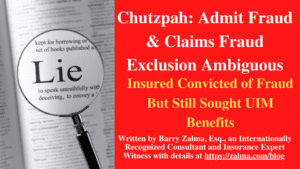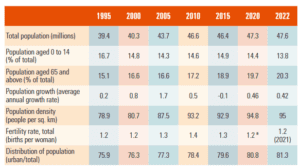Chutzpah: Admit Fraud & Claims Fraud Exclusion Ambiguous

See the full video at https://rumble.com/v1bb909-chutzpah-admit-fraud-and-claims-fraud-exclusion-ambiguous.html and at https://www.youtube.com/watch?v=M0M1NnIgfc8
“Chutzpah” is a Yiddish term meaning “unmitigated gall” where, for example, a defendant convicted of murdering his parents asks for clemency because he is an orphan.
Kevin Muir made a claim for underinsured motorist benefits after being injured in an auto accident that fit the definition of Chutzpah. His insurance company denied the claim because Muir had admittedly previously made fraudulent statements in an effort to obtain personal injury protection benefits related to the same accident and was convicted of a crime relating to the claim. Although the policy, like all insurance policies, excluded claims related to fraud, Muir still sued the insurance company after it denied his claim. The insurer filed a motion for summary judgment and the district court dismissed Muir’s lawsuit.
In Kevin Muir v. Cincinnati Insurance Company, 2022 UT App 80, No. 20210289-CA, Court of Appeals of Utah (June 24, 2022) the Court of Appeals found the fraud exclusion clear and unambiguous.
BACKGROUND
Muir is listed as a “covered driver” under an auto insurance policy (the Policy) issued to him by Cincinnati Insurance Company (Cincinnati). The Policy provided several types of coverage, including liability, personal injury protection (PIP), uninsured/underinsured motorist (UIM), and collision.
In 2017, Muir was riding as a passenger in a vehicle that was rear-ended by another vehicle. Muir suffered injuries and received $25,000 in damages from each of the two drivers’ insurance companies-amounts that represented the policy limits of those policies. Cincinnati also paid out PIP benefits to Muir under the Policy.
THE FRAUD
In connection with his PIP claim, Muir “stated that he was not working due to the injuries he sustained,” but this statement was false: Muir was, in fact, “working as a self-employed truck driver.” As a result of his false statement, Muir “was charged criminally with insurance fraud and entered ‘no contest’ pleas to reduced Class A misdemeanors.”
THE CLAIM
Muir subsequently made a demand for UIM benefits under the Policy. However, Cincinnati denied coverage, relying on the Policy’s fraud exclusion, which reads:
‘We’ do not provide coverage for any ‘covered person’ who has made fraudulent statements or engaged in fraudulent conduct in connection with any accident or loss for which coverage is sought under this policy.
Following this denial, Muir sued Cincinnati for breach of contract and breach of the duty of good faith and fair dealing. The parties filed cross-motions for summary judgment on the question of whether the Policy’s fraud exclusion precluded Muir’s claim for UIM benefits.
The district court granted Cincinnati’s motion and denied Muir’s.
ANALYSIS
Muir claimed that the Policy’s fraud exclusion was ambiguous and asked the court to construe the ambiguity in his favor.
The Court of Appeals noted that an insurance policy is merely a contract between the insured and the insurer and is construed pursuant to the same rules applied to ordinary contracts. An insurer may exclude from coverage certain losses by using language which clearly and unmistakably communicates to the insured the specific circumstances under which the expected coverage will not be provided.
The Policy contains a fraud exclusion that bars coverage when a claimant makes a fraudulent statement in connection with any accident or loss for which coverage is sought. Muir acknowledged that he made fraudulent statements in securing PIP benefits in connection with the accident in question but argued that those fraudulent statements should not negate his claim for UIM benefits.
The fraud exclusion is contained in the “General Provisions” section of the Policy, not within any specific coverage provision, so the exclusion is applicable to all types of coverage provided by the Policy. The inclusion of the word “accident” in the fraud clause links the misrepresentation to the accident in question, not just to the coverage sought, and makes Muir’s preferred reading of the provision unreasonable, especially given Muir’s admission that his “fraudulent conduct was indeed ‘connected’ to the accident” at issue.
The accident for which Muir sought UIM coverage is the same accident for which he made fraudulent statements in seeking PIP coverage. And the Policy precludes coverage sought in connection with any accident for which a covered person has made fraudulent statements.
The Court of Appeal, therefore, agreed with the district court’s determination that Cincinnati was, as a matter of law, within its rights under the Policy to deny Muir’s claim for UIM coverage.
This case teaches that there is no such thing as a small or inconsequential fraud. The fraud language of the policy was clear and unambiguous as it applied to the entire policy. Muir fraudulently collected on his PIP claim when he succeeded in his attempt to defraud Cincinnati and was convicted criminally of the attempted fraudulent claim. His chutzpah in seeking UIM coverage under the same policy where he was, because of his fraud was unmitigated and not worthy of a law suit let alone an appeal. In fact, Cincinnati should seek to recover as restitution the money paid in PIP benefits.

(c) 2022 Barry Zalma & ClaimSchool, Inc.
Barry Zalma, Esq., CFE, now limits his practice to service as an insurance consultant specializing in insurance coverage, insurance claims handling, insurance bad faith and insurance fraud almost equally for insurers and policyholders. He practiced law in California for more than 44 years as an insurance coverage and claims handling lawyer and more than 54 years in the insurance business. He is available at http://www.zalma.com and zalma@zalma.com.
Subscribe and receive videos limited to subscribers of Excellence in Claims Handling at locals.com https://zalmaoninsurance.locals.com/subscribe.
Subscribe to Excellence in Claims Handling at https://barryzalma.substack.com/welcome.
Write to Mr. Zalma at zalma@zalma.com; http://www.zalma.com; http://zalma.com/blog; daily articles are published at https://zalma.substack.com. Go to the podcast Zalma On Insurance at https://anchor.fm/barry-zalma; Follow Mr. Zalma on Twitter at https://twitter.com/bzalma; Go to Barry Zalma videos at Rumble.com at https://rumble.com/c/c-262921; Go to Barry Zalma on YouTube- https://www.youtube.com/channel/UCysiZklEtxZsSF9DfC0Expg; Go to the Insurance Claims Library – https://zalma.com/blog/insurance-claims-library/
Like this:
Loading…
Related




